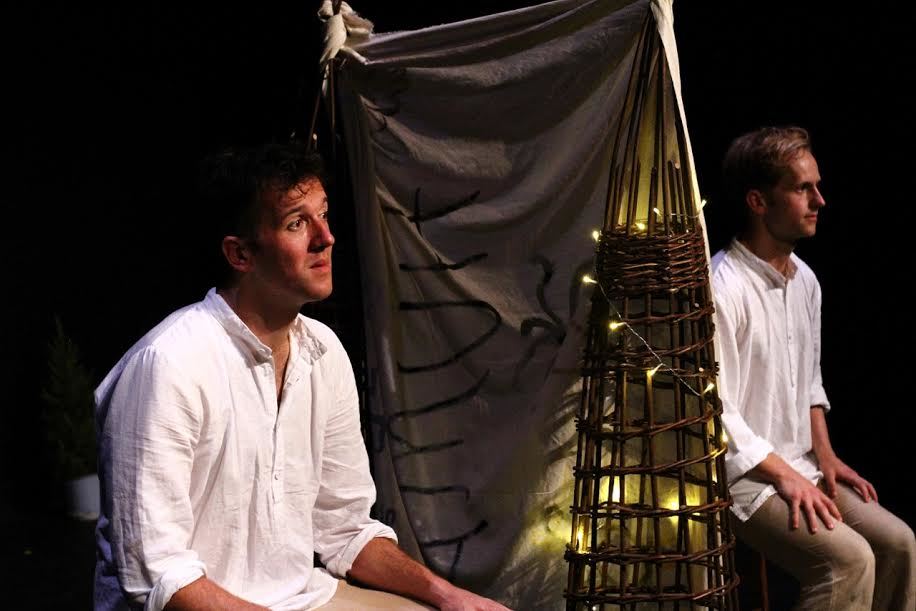Explore the ins and outs of running a small theatre company with Fledgling Theatre.
Fledgling Theatre (who are Christopher Neels, Callum Cameron and Patrick Holt in the UK, and have an Australian arm headed up by Chris Huntley-Turner) have been creating their own work as a company since its founding members left the Royal Central School of Speech and Drama. Their most recent production, ‘They Built It. No One Came’, is a bittersweet comedy about two men who create a utopian commune – and fail to attract any members to join them. The team are now taking the production on tour across the UK after a very successful run at the Edinburgh Fringe festival. Their next stop is the Brighton Fringe. We sat down with Fledgling to explore the realities of starting your own theatre company, and creating your own work as a performer.
Especially if there’s a couple of you in the company, it will take a couple of productions before you decide on a path you want to go down artistically. The first couple are definitely going to be more experimental.
Hey Fledgling! You guys went to drama school together and very quickly started putting on your own work – what was the motivation behind creating your own company so soon?
CN: I went to drama school in New Zealand first, then came over. Towards the end of drama school I felt a kind of panic that I was never going to work. So, before we even finished, we wanted to make sure we put a show on – for better or for worse! I think what’s been really good about how we’ve developed over the last 3 years is that that first show was very much me freaking out, writing a script and us pulling it together. Whereas now it’s a much more considered process because we realised we could do it and it would be fine. The big thing coming out of drama school, for me, was [the desire] to create some sort of company, though we didn’t know what it would be.
CC: I think it takes a while to find your voice as a company. Some people are lucky to have it straight away but even if you train together, you need to do at least one or two shows to know what you’re trying to say and the style you want to do it in.
PH: Especially if there’s a couple of you in the company, it will take a couple of productions before you decide on a path you want to go down artistically. The first couple are definitely going to be more experimental.
It’s an ongoing process clearly! So take me back a step: how do you actually start a theatre company? Is it just a matter of saying ‘we’re a company’?!
PH: From what I remember, it was [Chris] having the script.
CN: Yeah, I wrote the first play. And then sort of pulled in a few people from the drama school and also at the same time, because I was from far away, [we] thought it would be important to pull in people from outside our trade. It has been very beneficial to us. So, about half the cast were people that were referred from productions like Slingshot (Park Theatre, 2013), which Callum was doing at the time… Those were the beginnings of what we would call the company. Then after that, when we were trying to figure out our next project, we did an R&D for three days, and we got…
PH: …loads of people!
CN: About 30 people came and we worked on very different projects. Then on the next production we tried to pull through those guys, and filter that in to how we created. That’s basically how we formed. The company, you would argue, would be the four of us. But at the same time, we’ve got a network. We belong to a network who, when we’re doing larger, more ensemble productions, are our first ports of call.
CC: And they’re all very good performers too, [with] specific talents – like choreography, or fight or music – that we then bring in.
CN: In 2015 we sort of set out to meet weekly, as a larger company, having an idea of what our show was going to be but not going off a script like our first production. We thought of it as ‘upskilling’ – trying to continue working your craft, because we didn’t want to get lazy, whether or not we were qualified… So, we did that which was very beneficial but financially just too difficult. And then at the same time it would be that sort of thing where you would be investing in the rehearsal space, but because you weren’t necessarily giving the performers a final goal – a definitive final goal – people would drop out along the way. Which is fair enough, because if they’re giving up their time, it has to be for a reason.

I guess it’s an experiment in the overarching management of a production, as well as being a creative experiment, isn’t it?
CN: Yeah there’s the dream that we’re all going to run around creating something, but it’s just not feasible. So, that was a good experiment for us as a company. Particularly when you’re developing and you don’t have the money to pay everyone, it’s knowing how to incentivise people without their feeling like they’re being short-changed.
PH: The effect that that had too was, when it came to actually doing the production, after a couple of months’ worth of workshopping and devising, everyone in it was very invested in it, because everyone there was very involved in the creation of it.
CN: Yeah, when you saw the show, it was their individual pieces throughout it.
Why set up your own company – why not just join someone else’s? Was it specifically a desire to write your own material?
CN: For me… I think there are a lot of theatre companies around that are doing work – doing very good work – but when I think of a ‘company’, I think of what we were trying to do in 2015 [with Jericho Creek] – where everyone was working together all the time, and it was more ‘rep’ I guess than a traditional company. At the same time, I’ve tried to be part of rep companies and felt short-changed. Also, you’ve got to audition and get in and if you don’t…!
PH: At Fledgling, it has always been, in my experience, a very safe creative environment, because you are initially surrounded by friends or people who are friends of friends who you inherently trust – you get a lot of formalities out the way early doors, and there’s something so much more satisfying to know that you’re making your own work.
CN: Yeah, it’s that personal investment that you get.
PH: I think that necessity is actually what goes to the heart of a lot of young companies starting out. In terms of why you’d make your own work – well, if there’s no work out there, what else are you going to do? You have to do something. Like Chris said, the angst rises before you even leave drama school.

You mentioned the fact that the way you worked on your last production, Jericho Creek, was very collaborative – that the production evolved as you went along. However, with this last production, you (Callum) wrote it first – how did you find that as a process?
CC: It was actually a similar process. After the last show, it was so sprawling and such a big cast, I thought it would be nice to try and get to the Edinburgh Fringe as a company. We were doing things on the London fringe but because of financing, we couldn’t get a long enough run whereby we could gather interest or anything like that. So, that was the idea. Taking 15 people would never have been viable for the fringe. So, I thought to scale it back and use core members – it’s not to say we won’t go back to that previous method – but just to give ourselves more of a platform… I wrote a bit, always with these two in mind, but we did loads of development and improvisation, so they would basically do an improvisation of a scene and I would go away and write it.
What’s been the biggest benefit of touring with the show?
…It’s always been us along for the ride. It’s different to do it yourself.
CN: I think the show was great for streamlining, to know as a company what we can do when we have our control over it all – we’ve done tours before with other companies but it’s always been us along for the ride. It’s different to do it yourself.
CC: I don’t know when you ever become a self-sustaining company but it’s probably a lot more years. The tour is a way of forming connections with theatres that can maybe help you in the future, developing new commissions or supporting you. The Greenwich Theatre are mentoring us. It’s great to be showing at The Crucible, at the Old Fire Station… they are all places that are now giving us a shot.
CN: It’s important to know that all these fringe theatres are now offering us support. They are an incredibly supportive network.
Find out more about this group of talented performers, writers and theatre producers, and get tickets to their latest show here. They’ll be at the Warren at the Brighton fringe from the 5th to the 7th May, then in Oxford, Sheffield, London, Stranraer and Dumfries!
Image credits: Camilla Whitehill












